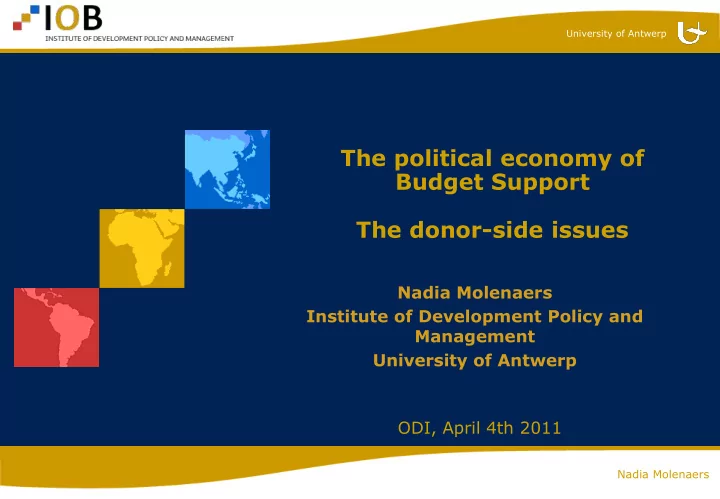

University of Antwerp The political economy of Budget Support The donor-side issues Nadia Molenaers Institute of Development Policy and Management University of Antwerp ODI, April 4th 2011 Nadia Molenaers
University of Antwerp “… donors react more strongly to concerns about political governance when they provide budget support. These sensitivities or concerns about good governance issues increasingly result in a number of EU Member States interrupting, reducing or stopping their budget support… the attention shifts from the developmental agenda to the political elements that underpin the budget support arrangements between partner country and donor. These include democracy, the rule of law, human rights … usually integrated in the Ups in the MOUs …” EC Green Paper 2010 Why do experts like GBS? Why are policy makers, parliaments and public opinion so hesitant/critical about it?
University of Antwerp What does political economy tell us about assumptions? (Level 0 entry conditions) • Donor readiness Assumption: • Policy makers face the same incentives as experts/aid agencies
University of Antwerp POLICY MAKERS GBS Political business cycle Developmental process, institutional reform Short term Long term Direct visible results, Indirect invisible results, easy to measure difficult to measure Indirect results, the broken feedback loop & info asymmetry Attribution Contribution Multiple purposes/interests: Clear priority -Diplomacy – Development - Democracy -Proliferation deliverables -Denmark Orthodoxy Risk avoidance A leap of faith
University of Antwerp Consequences • Donor dynamics in assessing government readiness – Eligibility criteria (assessments) vary widely & become tighter – Status of political Ups • Increasing expectations regarding what GBS can/should do (see next slide), especially when a crisis occurs – Policy dialogue beyond budget/expenditure – Political conditionalities • Predictability of GBS is heavily undermined • Portfolio approach – Proliferation, fragmentation, isolation of policy dialogues
University of Antwerp What GBS should do… Technocratic road Technocratic+Democratic road GBS-goals One instrument, one goal One instrument, two goals Forum Policy dialogue: technocratic Policy dialogue must be open for technocratic and democratic (democratic issues should be dealt with reforms/concerns – political elsewhere, not tied to GBS) conditionalities Dominant in WB, EC Increasingly bilateral donors, especially during and after „ abnormal ‟ events (crisis) Advantages Predictable – toolkits Flexibility for donors Perceived as less intrusive Legitimacy/reputation donors BS = carrot and stick Disadvantages Over-technocratisation BS = stick for democratic regress, reactive (ex-post), unpredictable Lack of democratic progress may (stop&go), emotional - no toolkits undermine technocratic progress (strategy) Under-use GBS/policy dialogue Bazooka effect: undoing progress Legitimacy issues (home – locally) Overburdening GBS/policy dialogue Perceived as intrusive: legitimacy locally
University of Antwerp Looking forward • Incentives for policy makers will persist + governance challenges in LICs will not disappear Stop & go GBS, and/or, More political conditionalities Unless… • A modality-like division of labour? – GBS for the politically „unrestrained‟ donors, SBS as the safer modality for bilateral donors ? – Portfolio approach may be sound to pro-actively tackle some democratic governance issues – The need to manage the disadvantages of the technocratic approach
University of Antwerp Thank you! nadia.molenaers@ua.ac.be http://www.ua.ac.be/dev /aid_effectiveness Nadia Molenaers
Recommend
More recommend